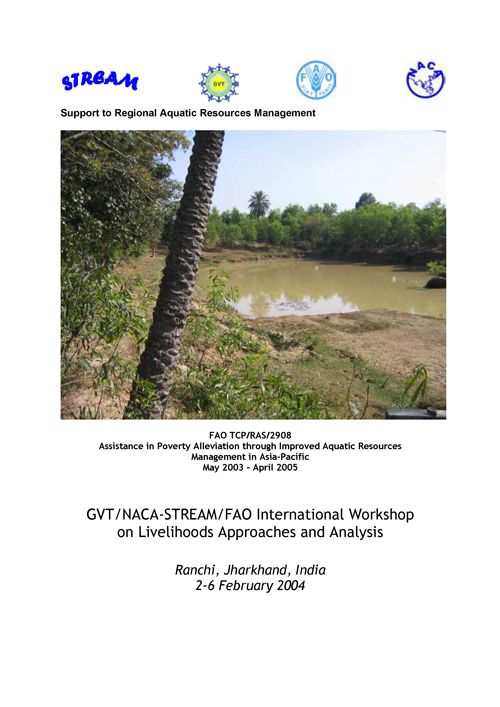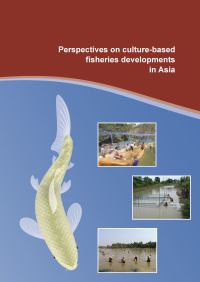International Workshop on Livelihoods Approaches and Analysis, Ranchi, India, 2-6 February 2004
27 April 2004 | 914 Downloads | .pdf | 456.21 KB | Gender, India, Livelihoods, gender and social issues
This is the report of the “GVT/NACA-STREAM/FAO International Workshop on Livelihoods Approaches and Analysis” that was conducted in Ranchi, India from 2-6 February 2004. The purpose of the workshop was to develop and document mechanisms for training in livelihoods approaches and analysis, and to build national capacity to conduct livelihoods analysis. The workshop in Ranchi was a joint India-Nepal event, with colleagues coming to participate from Kathmandu and other areas of Nepal. The workshop in Ranchi was the second in a series, the first of which was held in Iloilo City, Philippines, in November 2003. Subsequent workshops will take place in other countries in the region, including Lao PDR, Myanmar and Yunnan, China.
The objectives of the workshop were to:
- Understand issues of interest to people whose livelihoods include aquatic resources management, especially those with limited resources.
- Build “(national) livelihoods teams” to do livelihoods analyses and training, and share their experiences with communities and other stakeholders.
- Share understandings of livelihoods approaches and analysis using participatory Methods.
- Review current NACA-STREAM livelihoods analysis documentation, adapt and supplement, towards the drafting of a Guide for Livelihoods Analysis.
- Experience the use of participatory tools for livelihoods analysis.
- Plan activities for carrying out livelihoods analyses.
- Consider how to build capacity in monitoring and evaluation (M&E) and “significant change”.
The week was spent exploring the complex nature of communities and groups with whom we work and sharing understandings about how best to learn about their livelihoods. Additionally, adaptations of the tools for learning and communicating about livelihoods – first developed in the “SPARK-STREAM Languages and Livelihoods Workshops” – were used to help participants understand livelihoods analysis processes.
A central element of the workshop was a visit to the Jabarrah community, where participants carried out activities to learn about the community’s livelihoods. In addition to gaining information about the Jabarrah community itself, participants also had important insights into how best to conduct livelihoods analyses.
One of the main outputs from the first workshop in the Philippines was a draft outline for a Guide for Livelihoods Analysis, which will be modified through the series of “Workshops on Livelihoods Approaches and Analysis” throughout the region. The lessons learnt from the community visit to Jabarrah fed directly into the drafting of this guide, and participants also drew on their experiences of the workshop activities to consider what kind of guide should be developed and what further actions should be taken.
Follow-up actions from this workshop include the dissemination of information about livelihoods analysis and approaches, piloting of a livelihoods analysis in Nepal, and continued work on the draft Guide for Livelihoods Analysis.
Creative Commons Attribution.

